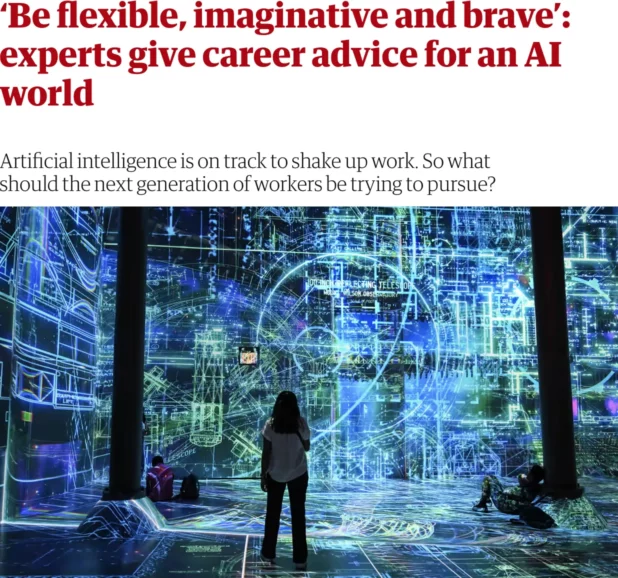If you ever needed a single piece of evidence to prove that the singular goal of the Jews is to destroy you, imagine that at this point in history, they are saying simultaneously that:
- We need more immigrants because white people are not breeding enough, and
- AI will soon replace the majority of jobs in white countries.
The only possible explanation for why someone would tell you both those things are true is that they are trying to hurt you.
They are creating a situation where in America in ten years, less than half of the population will be white, and none of this brown mass will be working.
Everyone knows that is what they are doing.
Teenagers deciding their future this year have a lot to contend with. In England, those who sat their A-levels suffered the biggest results drop on record while the top grades in GCSEs also fell. And now they face the question: will the career I choose to pursue even exist by the time I enter the workforce?
Artificial intelligence has hit the mainstream with the popularity of generative AI programmes driven by large language models such as ChatGPT. Businesses are increasingly adopting the technology. A study, which was published last week by the cybersecurity firm Kaspersky, suggests 57% of workers are using such tools to save time in the office, especially for summarising meeting notes and long documents.
Yet the automation of such tasks also means the chance to eliminate or reduce certain roles, not just in administration, but across many fields as the technology becomes more sophisticated. According to a survey of professionals by Thomson Reuters published last week, 67% of respondents believe AI will have a great impact on their profession in the next five years, while more than half predict the technology will create new career paths.
So exactly what are those new professional opportunities that the next generation of workers should be trying to pursue?
“There is no such thing as a future-proof career anymore,” says Dr Andrew Rogoyski, the director of innovation and partnerships at the Surrey Institute for People-Centred Artificial Intelligence at the University of Surrey.
“AI and other forms of automation have been disrupting and changing careers for years now and generative AI is the latest technology encroaching on careers that we previously thought safe from technological advances – it’s all being disrupted by AI.”
According to Rogoyski, subjects such as science, engineering and cyber-security will continue to be in demand, despite AI assistive technologies that may be used in the field. Similarly, careers in healthcare that involve human-to-human interaction: nursing, social care and medicine for example.
“I would advise students to become AI literate, you don’t have to be coding AI software but you will probably be using AI tools in your future career so get a head start. Careers may always evolve, change and dissolve, my advice to students is to be flexible, imaginative and brave,” Rogoyski says.
James Knightley, the chief international economist at the Dutch banking group ING, doubts “very much that any career will be untouched by AI”. He suggests one safe bet is to become a skilled artisan, for example learning high-end carpentry.
One area that looks in real trouble is the creative sector, with Rogoyski saying roles such copywriting and graphic design could be gradually outsourced to AI. The sector has struggled with the advancement of generative AI tools: from writers striking in Hollywood against such tools being used to produce scripts and story ideas, to film-makers using image generators in their work such as DALL-E 2.
There will be zero writing at all. When AI can write in my style and I can just tell it the basic points I want to make, I plan to relax. (As some of you probably noticed, I have messed around with AI some since it came out, but it’s really too primitive right now, and the hallucinations make it totally unfeasible for sourcing anything. It can transform bullet points into paragraphs, as long as you don’t let it include any of its own information, and I should probably be relying on that a bit more right now for my carpel tunnel. But in the medium term, it is going to be able to fact-check itself, and there will be no need for writers.)
But what about doctors? And lawyers? What do they do that computers can’t do?
It’s going to primarily target “white collar” jobs. The whole “robots that move around like people” thing from science fiction hasn’t been worked out very well at all. Boston Dynamics has some impressive footage on YouTube, I’m sure, but there is no way to power those machines for more than a few minutes.
The hilarious thing is that retarded normies are still getting student loans to go to college for jobs that won’t even exist when they graduate.
So, yeah – probably a carpenter is a good place to be.
Or, mayhaps, the Jews will demand the whole AI thing be shut down because it’s incompatible with Holocaust math. Women, also, are demanding it be shut down because men prefer AI girlfriends to real women.
Probably, though, there is just too much money and opportunities for weird abuses to not allow AI to be widespread. They will just make laws that you’re not allowed to ask it about Holocaust math or make it your girlfriend.


